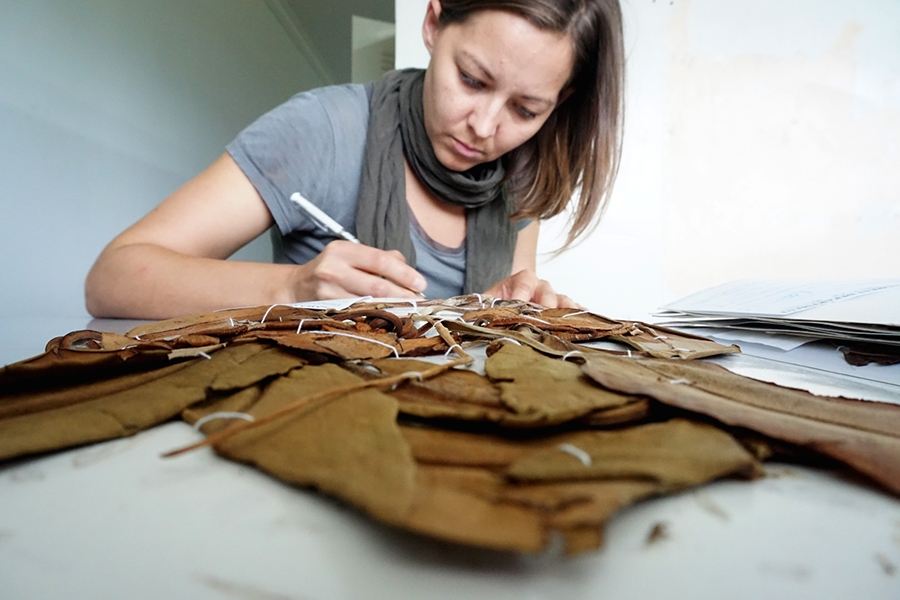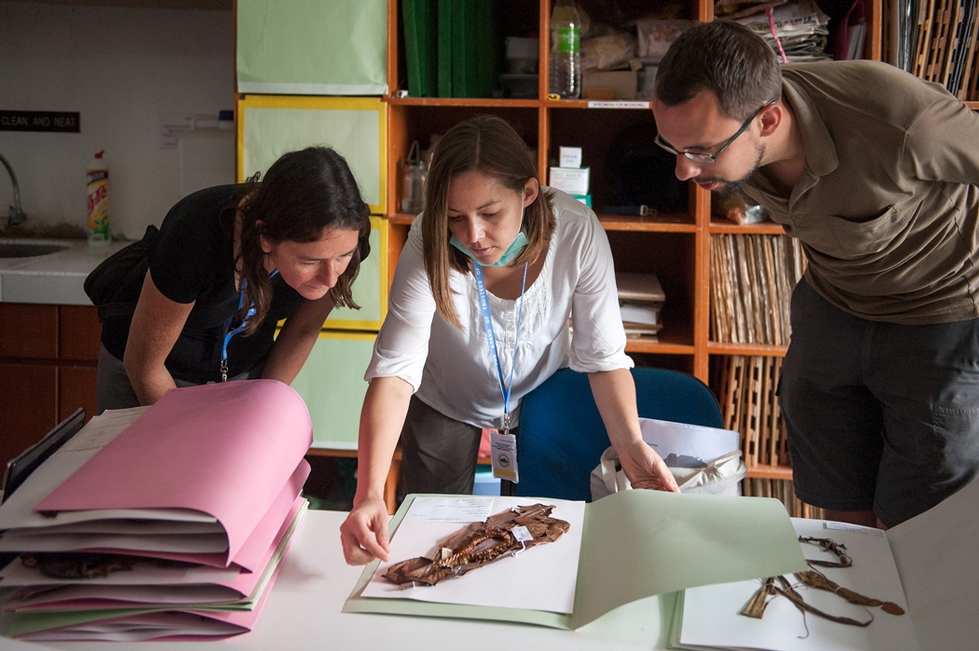Finding fellowships
Pairing exceptional students with opportunity
Rachel Schwallier grew up on an apple orchard in Coopersville, and still comes home every summer to help her parents on their sustainable fruit and vegetable farm in Conklin.
The big difference between her childhood and now is where she spends the rest of the year.
Whether she’s hiking up the side of a mist-shrouded mountain in Malaysian Borneo, looking for exotic carnivorous pitcher plants, or studying their morphology and anatomy for her doctorate at a lab at Leiden University or the Naturalis Biodiversity Center in the Netherlands, it’s a given that Schwallier has taken a liking to working and studying overseas.
“When I was growing up, I never expected that I might be traveling around the world for my career. I had never been exposed to such a lifestyle,” Schwallier said, “but now, I cannot imagine my life any other way.”
Schwallier started her journey toward earning a doctorate at Leiden while she was an undergraduate at Grand Valley. She first studied abroad in Australia as part of a class for her biology major. She loved the chance to see other places and experience other cultures, and the seeds were planted for a future of travel and research.
After receiving her bachelor’s degree in 2004, Schwallier stayed at Grand Valley to earn a master’s degree in 2007, then took a job at Frederik Meijer Gardens and Sculpture Park in Grand Rapids where she worked in the carnivorous plant house.
“When the public would come through and see these plants that thrive through eating insects, they were immediately captured by their unique habit and spectacular shapes, and they would ask a lot of really good questions,” Schwallier said. “It was invigorating to share my curiosity with them.”

Rachel Schwallier works on carnivorous pitcher plants as part of her doctoral program.
But a career outside of academia and research wasn’t what Schwallier really wanted, she said. So the journey toward a doctoral degree started, and Schwallier sought out the help of the Frederik Meijer Office of Fellowships at Grand Valley, where students and alumni receive assistance with applying for highly competitive external scholarships and fellowships that fund various study, research, teaching and travel opportunities.
It was at the fellowships office that Schwallier met Amanda Propst Cuevas, the former director. A strong partnership emerged.
“I went in focused on applying for a Fulbright scholarship, but Amanda’s direction harnessed my energy instead on two specific and better-targeted scholarships that were more suited given my research path,” Schwallier said.
Cuevas served as the founding director of the Frederik Meijer Office of Fellowships until May 2015 and helped students earn more than $1 million in scholarships and awards over the past five years. She said the specialty of the office is helping students seek out awards that will help them achieve their goals while learning about themselves in the process.
“Our role in the office is to help each student design a plan that’s best for them,” Cuevas said. “Not every award is going to work for every student, so we need to get to know each student on a one-on-one basis and really be able to help point them to the best opportunity.”
Links
For more information on competitive awards and scholarships at Grand Valley, visit gvsu.edu/fellowships.
Learn more about opportunities for scholarships through P.E.O. at peointernational.org.
After talking with Schwallier about her doctoral research project and goals, Cuevas suggested that Schwallier schedule a meeting with Marcia Haas, the university’s first lady, who is involved in an organization called the Philanthropic Education Organization, better known as the P.E.O. Sisterhood. P.E.O. is designed to help women achieve their educational goals through grants and scholarships.
Schwallier had a meeting with Cuevas and Haas and started the process toward applying for a P.E.O. Scholar Award, which awards $15,000 to a woman completing a doctorate at an accredited college or university.
As with other students who work with the Office of Fellowships, Schwallier spent countless hours completing the in-depth application for the award, which is very competitive and requires a good deal of personal reflection and time.

Schwallier received the Scholar Award, one of several grants that is funding the remainder of her doctoral program and study of the carnivorous pitcher plants across southeast Asia.
“These are very extensive applications that take weeks or months to develop,” Cuevas said. “Students aren’t applying for something like this the night before. It’s a very intentional commitment of time and attention over a significant period of time to prepare a strong application. It speaks to the strong quality of our students. They’re working to make a difference, in many cases internationally, and to win these awards when competing with the highest caliber students across the nation takes time and drive.”
Haas described the application and interview process as a very serious matter, with thorough vetting from a committee of P.E.O. members from the local chapter to help decide if an applicant should be presented to a national selection committee for formal review.
But the process was a great pleasure as well, Haas said. “Even though there is a very structured way to apply and every applicant has to have a recommendation, we really get the great experience of getting to know these amazingly talented young women who have such determination to make a difference in the world,” Haas said. “Rachel has been such a joy to get to know. I really treasure the relationship I have with her.”
The application process for the P.E.O. award was a good one for Schwallier as well. “I have learned that the women in P.E.O. are very tight-knit and involved in the personal lives of the women they support,” Schwallier said. “Since meeting the women of P.E.O. and winning the Scholar Award, I have received handwritten Christmas cards from across the Atlantic, saved newspaper clippings, and more heartfelt emails than one can count.”
Even with determination and hard work, the awards and grants that students apply for through the Frederik Meijer Office of Fellowships are far from guarantees. “Grant writing is a learning process,” Schwallier said. “There is a saying in the scientific community that, ‘If you are not getting rejected once in a while, you are not aiming high enough.’ You learn quickly what makes the an application more competitive and how to make it stand out.”
This led Schwallier to earn the Scholar Award, one of several grants that is funding the remainder of her doctoral program and study of the carnivorous pitcher plants across southeast Asia.
“The award from the P.E.O. Sisterhood enabled fieldwork to collect data and samples through expeditions to isolated regions deep in the forests of southeast Asia,” Schwallier said. “With this work, we are able to deliver an important conservation message about this iconic group of plants.
“Traveling and research abroad is fantastic in that it forces you out of comfort – you realize quickly that connections with the people you meet along the way or those in your everyday life are the most important part of your life. The Meijer Office of Fellowships allowed me the opportunity to meet and live with an extremely diverse number of people, creating an extremely valuable life experience.”
While Schwallier was awarded the P.E.O. Scholar Award, Haas said the organization, of which she has been a member of since she was in college, has several other awards that assist women in different stages of their education. Having a connection at the university has been a wonderful pipeline for talented candidates, Haas said.
“Amanda had heard of P.E.O. Sisterhood from her work before coming to Grand Valley, and I’m incredibly glad that she reached out to us so we can consider even more wonderful young women for these awards,” Haas said. “In Rachel’s case, we had an award that we knew she would fit perfectly, and I’m glad that this has led to more educational opportunities for other exceptional young women.”
Meijer Office of Fellowships
The Frederik Meijer Office of Fellowships, now directed by Elizabeth Lambert, has seen significant growth over the years in the number of students that are applying for various competitive scholarships and grants, including the U.S. Student Fulbright Scholarship, the Critical Language Scholarship, the Benjamin A. Gilman International Scholarship, and the Barry M. Goldwater Scholarship, along with dozens of others.
“The Gilman, like all other nationally competitive awards, can be life-changing." Amanda Cuevas
One of the programs Grand Valley students have had the most success with is the Gilman International Scholarship, which is designed to help offset some of the costs associated with studying abroad. Since 2010, more than 70 Grand Valley students were offered a scholarship under the program, totaling more than $270,000.
Grand Valley has also been named a top Fulbright producer for the 2014-2015 year, and Cuevas expects more students to apply for all of the awards as they become aware of opportunities.
Cuevas said the award she thinks is one of the most powerful is the Gilman, because one of the requirements for earning the award is showing financial need. The Gilman scholarship is often the first nationally competitive award that qualified students encounter and it can serve as a springboard to applying for future awards such as the U.S. Student Fulbright, among others.
“The Gilman, like all other nationally competitive awards, can be life-changing,” Cuevas said. “I personally love the Gilman because it affords the opportunity for college students who may not have otherwise had the financial means to experience other cultures through travel.”
The application process, and being able to personally connect with university staff are invaluable benefits to students who seek out fellowships and scholarships. Cuevas described the fellowships experience as an ice cream sundae: the most important part, the process of self-discovery and pushing students to reach their full potential, is the ice cream, and when students receive offers for the exceptionally hard-to-get awards, that’s the cherry on top.
“Many naturally like to look at the money, and the connections, and the opportunities afforded to students and alumni who pursue nationally competitive awards as the most critical metric for what we do here,” Cuevas said, “but helping students maximize their college experience, dream even bigger than they once thought possible, and in many cases, positively change the course of their plans for the rest of their lives, is truly the most valuable and important work that’s being done here.”
